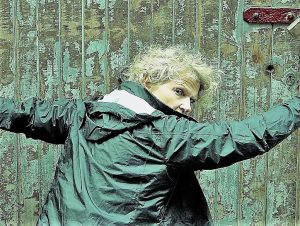Bluestone Church Arts Space, Footscray
Reviewed on June 20, 2017

Sourcing emergency and permanent accommodation for Melbourne’s homeless, is a community crisis stretched to breaking point.
Even as little as a decade ago, it was rare to see people living rough on our city streets. Today, pinpointing a viable solution to this growing problem is a very different story.
On any given evening, taking the short walk from Bourke Street Mall along Elizabeth Street towards Flinders Street Station, is a sobering experience, to say the least.
This ten – minute stretch is scattered with displaced individuals begging for food or money, fighting the elements, and doing what they can within the law’s strict parameters, just to survive.
Making her home in the world’s most livable city, Clare Mendes is an accomplished Australian novelist and playwright.
With a solid list of plays to the writer’s credit, staged pieces include ‘The Agreement’ and ‘Little Impurities’. For radio, Mendes has written ‘Ama de Casa’, ‘Harvey Kildaire’, ‘Katja’s Refuge’ and ‘On the Dotted Line’. Her published books are ‘Drift Street’, ‘A Race Across Burning Soil’, ‘The Curtain Raiser’, and ‘The Unvoiced Consonant’.
Mendes’ latest work, ‘Trash Goes Down The River’, is brave, powerful and confronting character study about Melbourne’s homeless. In it, the author gives this difficult issue a strong, political context and a mature, poignant vision, head – on.
Mendes’ passionate point of view on the subject is clear from the outset. News clippings about the recent removal by force, of homeless protestors from Flinders Street Station, plaster the walls and set the tone as patrons enter the venue’s foyer.
Playing for a strictly limited season, it is interesting to learn that the play started out as an extended monologue.
This newly – expanded version clocks in at eighty minutes in length. Told in a single act, the non – linear narrative fuses together multiple flashbacks, striking use of subtext, and some thought – provoking speeches to tell its complex, gripping story. In the course of the play, we also learn that each character has suffered some form of displacement, at one time or another.
Melody (Emma Cox) is a wedding planner and aspiring social climber. Her husband, Rich (Alec Gilbert), is the Deputy Lord Mayor for Melbourne. Together, they scheme to bring Melody’s dream of creating an exclusive, gated housing community, to fruition.
As Deputy Mayor, it is Richard’s job to beautify the CBD.
Which essentially means, cleaning up the city’s streets. But, new coats of paint, park benches and expensive stand – alone public toilets are not nearly enough. It is also his job to shift out the homeless.
Somehow caught up in this scheme, Trash, or Donna (played by Clare Larman), is down on her luck with nowhere to go. One by one, circumstances have taken away her job, her friends, and finally, a roof over her head.
Without giving out any more plot points, the play details his solution with devastating results.
Veteran stage, television and film actors, Cox, Gilbert, and Larmen all flesh out and bring this unexpected trio to life. In their expert care, these characters are both real and flawed at the same time.
Larmen imbues her character with hope and desperation, in equal measure. Told in real time and flashback, there were several moments when Donna’s situation was highly confronting.
Longing for the simple innocence of his country upbringing, Gilbert painted Rich as a man on shaky ground. Responsible for not only cleaning up this mess but keeping Melody happy at the same time, Gilbert played this character as very much a frustrated fish out of water.
Cox gave her role a raw mixture of steel and fragility. At times she reminded me of Geraldine Page from the film, ‘Sweet Bird Of Youth’.
Direction and design by Elizabeth Walley, stays in tandem with Mendes’ script.
This is very much a story where the dialogue defines both character and motivation. These elements alone, provide helpful verbal clues for the audience to follow along.
Walley also keeps staging to a bare minimum; a chair and a table, and a bench are the only visible props.
Costumes define each player’s socio – economic status.
Melody and Rich are either decked out in expensive evening wear, or upscale casual clothing. Meanwhile, carrying her belongings at all times, Donna is dressed in a worn – out sweater and track pants.
Scene changes are determined by static slide projection and soft fade outs.
Framed by the auditorium’s central rear wall arch, here, oversized images rotate between Melbourne’s city skyline, to undeveloped land along the Yarra River, and back again.
Responsible for the show’s lighting design, Bronwyn Pringle divides and delineates each scene change with subtle spot dimmers.
A frame of lights, placed to good effect, adorns the entrance to the performance area. Its use becomes clear within the context of the story, where much of the action takes place at a celebration on – board a river cruiser.
Sound design from Sekar Astiari, provides a solid multimedia backdrop to the narrative. Underscoring, such as pre – recorded party conversation and other subtle effects, work as a base to the blocking and lighting.
Smooth stage management from Michele Bauer (with Claudia Validum), keeps the action fluid and clear.
“Trash Goes Down The River” is an important and timely piece. Not only does it highlight a difficult problem with substance and sensitivity, it weaves this issue into a meaningful story that carries the audience for the full length of the ride.
The play is running at the Bluestone Church Arts Space in Footscray until June 24.
Image Source: Weekend Notes
